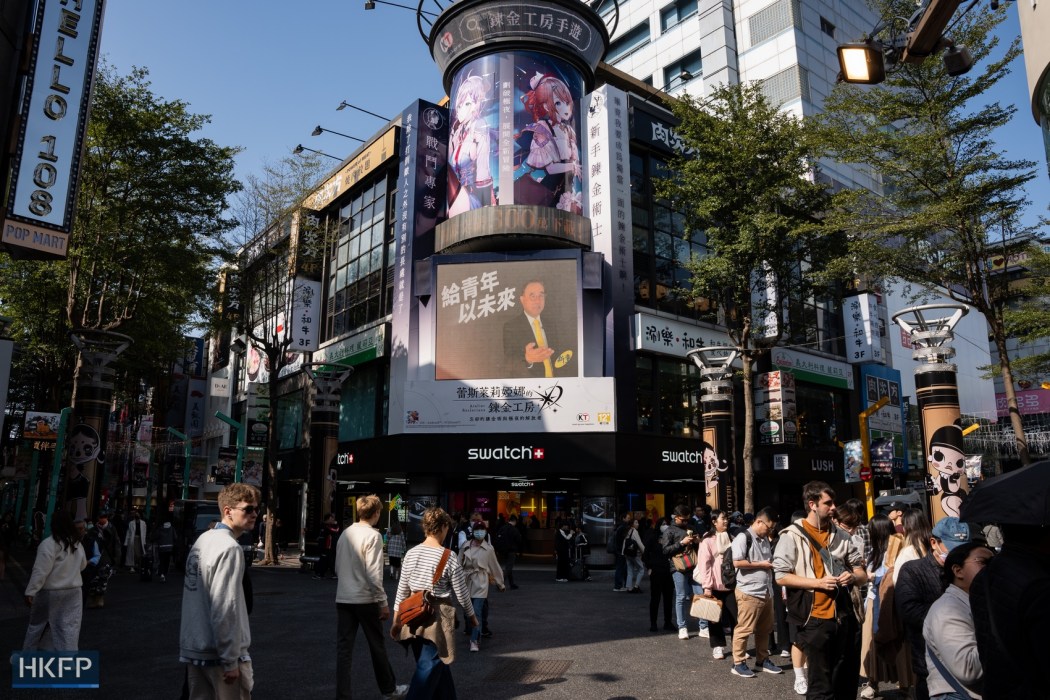Taipei, Taiwan
Taiwan presidential election hopeful Ko Wen-je, who is striving to break the self-ruled island’s two-party dominance, has described himself as the only candidate “acceptable” to both China and the US.

Ko’s remarks came a day ahead of the election on Saturday, when Taiwan’s next leader and legislature will be decided. In a leadership race historically dominated by the ruling Democratic Progressive Party (DPP) and opposition Kuomintang (KMT) party, the Taiwan People’s Party (TPP) candidate has asserted himself as the “third force,” campaigning on the promise of bringing real change to the island, which Beijing considers to be part of China.
At a press conference with international media in Taipei on Friday morning, Ko and his running mate Cynthia Wu were repeatedly asked about the TPP’s stance on cross-straight relations and how, as relative political newcomers, they intended to handle relations with Beijing and Washington.
See also: Taiwan election 2024 – The 3 presidential candidates and what they say about relations with China
Ko, who spoke in Mandarin, said through an interpreter that he intended “to make things… tolerable, acceptable for both China and the US… I think my greatest strength is that I am the only candidate that both China and the US views as acceptable.”
He would do this, he said, through improved dialogue between Taipei and Beijing. “My goal is to enhance communications… [that] will increase friendliness, and at the very least decrease miscommunication.”

Despite saying that “the people of Taiwan have long grown tired of the political status quo,” he said he would continue the foreign policy agenda of outgoing DPP President Tsai Ing-wen.
Tsai has favoured warmer ties with the US, which have come at the cost of China relations and have resulted in increased military incursions around the island.
However, he said he hoped to move Taiwan towards a three-party system, whereby no political party held a majority in parliament, saying that it was the first time in the island’s democratic history that a third-party candidate had been so close to the presidency.

Wu, who has been dubbed the “Shin Kong princess” by Taiwan media in reference to her family’s multi-billion dollar empire, dismissed what she called “labelling,” saying that such attacks had been levelled against her by the TPP’s opposition.
“I see that as a tactic from the opponents,” she said in response to a question about sexism and misogyny in politics, apologising for the hoarseness of her voice after days of aggressive campaigning. By turning the discussion onto her privileged upbringing, it took the spotlight off her political agenda, Wu said, before affirming that her policy focuses were climate change, digital transformation and health amid the island’s rapidly ageing population.
Asked what he thought of Hong Kong’s One Country, Two Systems model, which has been proposed by Beijing as a means of governance for Taiwan, Ko said: “Taiwan is different from Hong Kong. Taiwan has its own government, military, and financial system.”
He continued: “One Country, Two Systems is the Hong Kong model. Let me be very clear right now, there’s no room for that in Taiwan right now and it won’t be an acceptable model for the people of Taiwan.”
‘Our choice’
On Thursday night, Taipei’s Bo’ai Road adjacent to the historical North Gate lit up with phone flashlights, as Ko attended a campaign rally designed to mimic a fireside chat featuring presentations from members of Ko’s campaign team and politicians who backed the former Taipei mayor.

In a speech, Ko revisited his achievements from his tenure as Taipei mayor from 2014 to 2022, including demolishing a special bus lane on Zhongxiao West Road. The removal took place on the eve of Ko’s inauguration in December 2014, after the road had been left unused for more than eight years.
Taiwan needed a “problem-solver” who could execute policies, Ko told the crowd, adding he could bring changes to Taiwan and make the island better.

Standing alongside his spouse Chen Pei-chi, Ko also thanked his supporters and said he was moved by their support and “did not know what to say.”
Many supporters of Ko, nicknamed “xiao cao” which directly translates as “little grass,” donned grass-shaped headpieces and waved flags. Some also brought their cats and dogs to the event.

Chants of, “Our choice – Ko Wen-je!” could be heard.
The event concluded with Ko singing his campaign song with the crowd. Some supporters later lined up to leave signatures on two inflatable dolls of Ko and Wu, which had been on tour around the island with the TPP candidates.

Members of the public left messages of encouragement such as “add oil,” which loosely translates as “keep it up,” while staff members reminded them not to sign on the dolls’ faces.
Ko will attend a final large-scale rally on Friday night on Ketagalan Boulevard, which his team vowed to fill with a crowd of more than 500,000 people.
Additional reporting: Mercedes Hutton.
Dateline:
Taipei, Taiwan
Support HKFP | Policies & Ethics | Error/typo? | Contact Us | Newsletter | Transparency & Annual Report | Apps
Help safeguard press freedom & keep HKFP free for all readers by supporting our team

LATEST FROM HKFP
HKFP has an impartial stance, transparent funding, and balanced coverage guided by an Ethics Code and Corrections Policy.
Support press freedom & help us surpass 1,000 monthly Patrons: 100% independent, governed by an ethics code & not-for-profit.










